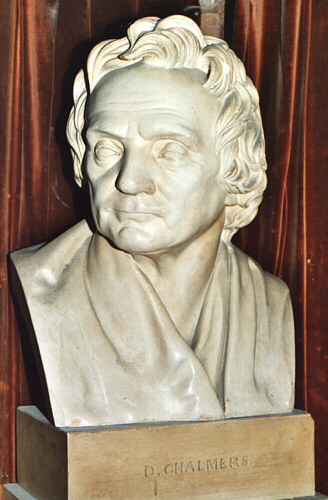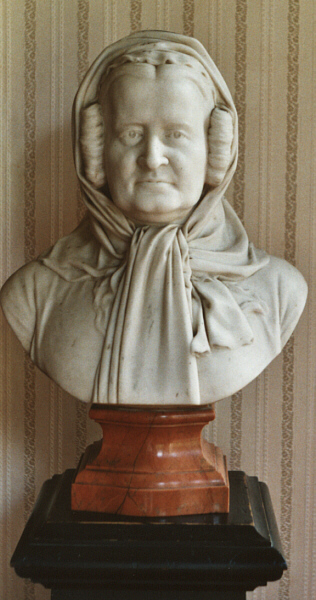

|
Thomas Chalmers entered the University of St. Andrews when he was only 11 and was a good mathematician. He started studying Divinity when 15, after which he became a minister at Kilmany. He believed that a minister could do his work in two days of the week and spend the rest thinking and studying. So he did and at St Andrews he gave successful classes in Maths and Chemistry, rather better and in some competition with the professors. An illness changed his outlook on life so that even though he became a Professor of Divinity between 1828 and 1843, he was committed to a liberal philosophy of enabling self-help for the poor (he opposed the compulsory levy in the 1845 Poor Law reform), the very philosophy that lay behind Bonskeid and the liberal approach rejected by such as John Murdoch who lived at Bonskeid early in his life.
An evangelical, Chalmers wanted the Church of Scotland to spread the Christian gospel to the poor. He established this function and role within the Kirk from 1834 but the Church came into the ten years of conflict with the state (ultimately over lay patronage related to the anti-landlordism that was strong in the country). He became a rather reluctant leader of the Great Disruption in that it led to 451 of 1200 ministers and a third of its members forming a Free Kirk. By 1847 they had 700 of their own churches and, given the inability to resolve its split with the Church of Scotland, the result was to be disestablishment and eventual effective secularisation of the state as the churches withdrew from direct involvement in education and welfare of the poor, often supported by the Free Kirk people who contributed their influence as individuals. Chalmers was fearful of the urban masses, whom in 1847 he called profligate, profane and heathen, and saw as a threat to the social order and a disgrace to Christian civilisation (see Devine, 1999, 368). He was anti-democratic, believed in the propertied classes and their economy as a divine right, condemed trade unions and supported philanthropy as a duty within this social order (371). |
Devine, T. M. (1999), The Scottish Nation: 1700 - 2000, Allen Lane, The Penguin Press, argues that the religious influence remained strong in Scotland and was placed into civic structures, and counters the secularisation thesis.

|
Sir James Young Simpson (1999) A bust which was in the Library He discovered the anaesthetic effect of chloroform |

|
Margaret Barbour (1999) A bust which was in the Library |
Adrian Worsfold